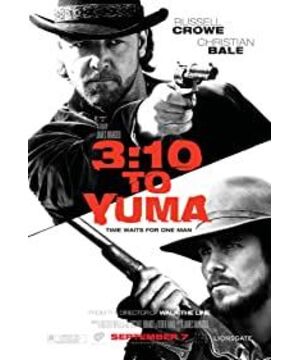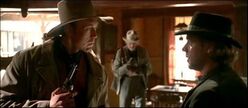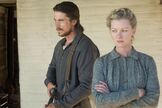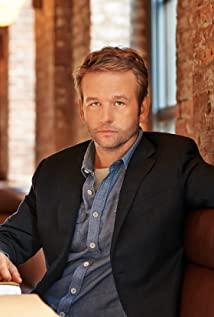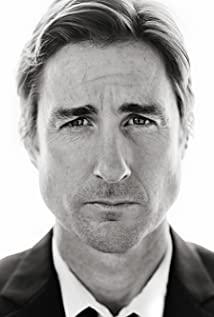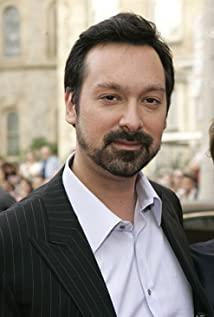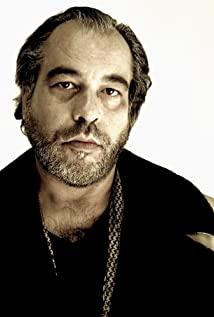The old version did not render the violent scene of the gangster robbing the car at the beginning. Glenn Ford's gang leader Ben Wade just "civilized" led the crowd to stop the carriage, and killed one of the escorts when he tried to pull a gun to resist. In the new version, this scene is inevitably extended into a hot and exciting gun battle. Weapons and equipment upgrades. Machine gun PK sniper. However, the end of the paragraph must be a solo show of the protagonist Wade played by Crow. It was he who drove the cattle that finally stopped the carriage that had almost escaped from the ambush ring. And it wasn't until the end of the film that the audience realized the other dramatic effect of the scene: Bell's son also learned from his idol, released the cattle in the circle, and covered the two from running off the platform... At first glance, it seems that the new version is for The adaptation and processing of this plot is almost perfect: it not only takes care of the aesthetic taste of modern audiences but also enriches the portrayal of characters. But, think again: no! Why did Crowe stop the carriage by driving the herd? Wouldn't everything be done by shooting the horse directly? !
I have discussed this topic with friends. During the debate, it was inevitable to be accused of overly evaluating the plot from its own logical point of view, while ignoring the director's creative intentions. It can't be said that what people criticize is completely wrong. But at the same time, I was thinking, why didn't I take it seriously when I watched "The True Color of Heroes"? Why don't you go to the real world when watching "Sunset Yellow Sand"? Why don't the bad guys in the classic 007 catch Bond and kill him immediately? ...obviously because of the style! When the director is trying to pursue a freehand, pompous and witty style, the rationality of the plot itself is no longer important. At this time, it is absolutely convincing that we say "the director does not intend to be here". And if the audience focuses on the rationality and logic of the plot and the behavior of the characters, it is obvious that they will be chasing faults.
But the opening paragraph of the new version of "Yuma Town" is obviously not on this list. First of all, the plot is a realistic narrative: the bloodthirsty gangsters will do anything to stop the carriage. There is no emotional basis for Pony's revenge on Brother Howe that is more emotional than rational; in addition, its most important purpose is to portray the calm and intelligent leadership of the hero played by Crowe. And under the circumstances, what is the best way to express wisdom? Of course, the ideal should be "the audience didn't think of it before, but they were amazed when they saw it"! And if the screenwriter's skills can't do this, at least they should choose a relatively reasonable one. For example, Crowe should shoot straight at the horse! Get the biggest win for the smallest price. Instead of inexplicably driving a herd of cattle down the hillside after sacrificing several brothers in vain. Obviously, the director of the film, while racking his brains to satisfy the audience's attention, ignores their IQ.
The plot of Wade's arrest is basically the same as in the old and new versions: because of nostalgia for the bar girl, he delayed getting out in time. However, due to well-known reasons, there is no Titanic-style gimmick in which women lie on their backs and men draw on the side. Personally, I prefer the delicate and subtle classical expression of the old version. Although the western wildness is less realistic, it is more consistent with the film's overall style of portraying the psychological activities of the characters as the core.
Wade in the old version never escaped, and certainly never got caught again. But this important change in the new version has caused contradictions in the character creation of the opposing sides in this escort team. To be fair, the plot design for Crow's escape is in the past. Bell and others do lack professional quality and are incompetent. And Crow, who was escorted by them, was so cruel, sophisticated and courageous. But the crest swayed and had to fall back to the main line at the 3:10 station. The plot requires Crow, who escaped, to be captured again. So joined the ruthless role of building tunnels. Defects also arise from this. The strong and experienced Crow seemed to have suddenly lost his keen insight into dangerous situations, and was so easily recognized and captured by his old enemy. And more interesting is the escort squad. This group of people who had previously appeared amateurish and disaffected turned into a determined, well-trained SWAT team in an instant: shovel raids signaled, guns drawn and punches. With compact, in one go! ?
Audiences are sure to love the twists and turns of the plot. However, the tortuous plot setting must be established on the premise of the consistency of the characters of the relevant characters to be contagious. The choreographer should not be out of character and simply twist for the sake of twists and turns. Take a look at the Coen Brothers classic "Frozen" here. How can an ordinary Messi He De He marry a rich man's daughter? After the wife's appearance, the mediocre appearance and funny accent gave the answer. This asymmetrical position, the family composition in the context, rationalizes the tensions between Weng's son-in-law and the motives of Macy's mastermind kidnapping for ransom scheme. Later, when the old man suddenly called to talk about the project, Messi was pleasantly surprised and was busy canceling the kidnapping plan. But the sudden insertion of twists and turns did not destroy the consistency of the characters' personalities: Messi then understood the true intentions of the old man. He was just trying to buy out the plan and didn't treat his son-in-law as a partner. In other words, he still looks down on this son-in-law! As for the kidnappers, due to the unprofessional and stupid characters that have been continuously strengthened, they are beaten for adultery, emotionally out of control and beaten to death by their old husband, and after receiving a huge ransom, they are finally served by an accomplice with a chainsaw because of a stolen car. Mutation can be called unexpected, but also reasonable. And Hitchcock's "The Lady Disappears." Why is the opening scene more than 20 minutes long and has nothing to do with the thriller theme? Is it just to exaggerate Heath's comedic vibe? I am afraid that the more important thing is to portray the characters to pave the way for the plot. For example: Only by showing the poor conduct of two English gentlemen at the inn can the audience understand why they are both uncooperative when faced with such a simple question of whether they have seen someone.
The biggest controversy in the film is the ending. A critic on Rotten Tomatoes pointed out that the problem with the new Yuma Town is that it doesn't do what a remake should. That is, to correct the defects of the original version. And the audience who can't accept such an ending may be more. However, I personally believe that people who hold opposing views do not necessarily lack relevant emotional input. More importantly, it may still be unacceptable to use such a way to tell the story of heroes cherishing each other. So, the debate about the ending is actually a matter of opinion in terms of aesthetic perception, not a question of a screenwriter's flawed skills. Everyone has more room to seek common ground while reserving differences.
View more about 3:10 to Yuma reviews


